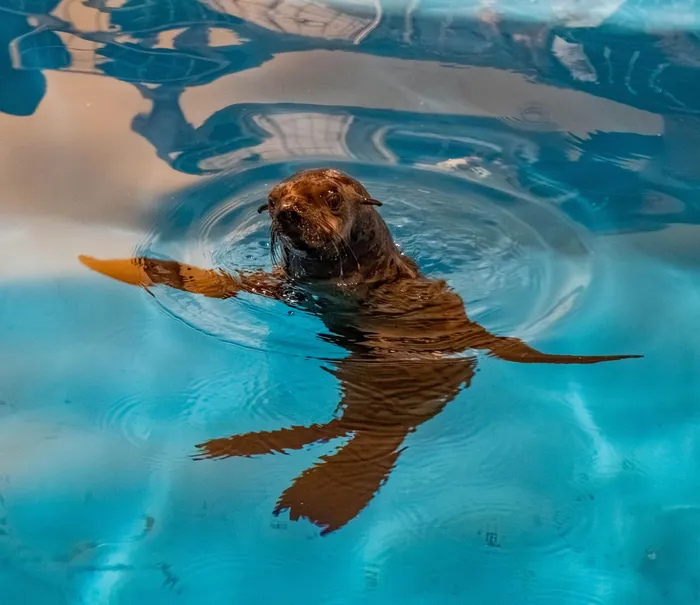
Captain Hook, a Cape fur seal, faced a life-threatening situation with fish hooks embedded in his mouth and back.
Image: South African Association for Marine Biological Research (Saambr)
Last month, the South African Association for Marine Biological Research (Saambr) shared a heart-wrenching and intriguing story about a young Cape fur seal, now affectionately named Captain Hook, who was admitted into their care.
This two-and-a-half-year-old seal captured hearts after he was found with fish hooks lodged in his mouth and back — a rare sight in the KwaZulu-Natal coast, where only one other Cape fur seal has been documented in the past 21 years at uShaka Sea World’s rehabilitation facility.
Captain Hook was captured in eManzimtoti in early July, where it is believed he followed the Sardine Run up the coast. When the sardines were no longer visible, he needed a new plan.
He saw what seemed like an endless supply of sardines connected to the end of the Toti fishermen’s lines. Despite being hooked several times, he continued to steal the fishermen's bait, and it became increasingly apparent that he needed urgent medical attention.
When he arrived at the rehabilitation facility, several hooks were safely removed from his mouth and back. The veterinary team gave him long-acting antibiotics to cover risks associated with the hooks and a painkiller.
A radiograph showed he has a hook lodged in his oesophagus, but the uShaka Sea World veterinarian, Dr Francois Lampen, wanted the seal to settle and regain its strength before further intervention.
Fortunately, Captain Hook’s recovery journey is progressing positively, thanks to the right medical care and affection from seal experts at the rehabilitation centre.
One of his caregivers, Hayley Tennant, said: “As he is still in the young, playful stage of his life, we have given him some basketballs to wrestle with, both in the water and out of the water. I think I enjoy watching him play with the balls as much as he loves throwing and drowning them.”
Saambr spokesperson Ann Kunz said that once Captain Hook settled down, and his blood results showed enough improvement to safely undergo anaesthesia, he was taken to the Village Veterinary Clinic in Kloof, where he underwent a gastroscope, which showed the hook previously seen in his oesophagus had moved into the muscle layer.

Captain Hook was in a life-threatening situation with fish hooks embedded in his mouth and back.
Image: South African Association for Marine Biological Research (Saambr)
“As the position of the hook is not impacting his health or movement in any way, the decision was made not to operate to remove the hook at this stage,” Kunz said.
She said that Captain Hook’s love for food and strong appetite, which had previously caused him trouble by boldly stealing bait from fishermen, is now working in his favour as he is gaining weight at a healthy rate.
“He loves his food and is fed a rich diet of pilchards, hake, sprats and squid, with squid being his least favourite (he believes squid is just like broccoli),” Kunz said.
“He still has a long way to go before he reaches his goal weight, but it is safe to say that he is now out of the woods and on the road to recovery.”
Kunz added that Captain Hook remains under quarantine as a rabies precaution, but he has received his vaccination, and the team currently has no reason to believe he has been exposed to the virus before arriving at uShaka Sea World.
Kunz reminded the public that in South Africa and Namibia, Cape fur seals have tested positive for rabies.
“This can pose a serious risk to people, and it is therefore dangerous for a member of the public to go anywhere near seals on the beach. If one is bitten by a seal, it is essential to seek immediate medical attention and to request a rabies vaccine,” Kunz said.
thobeka.ngema@inl.co.za